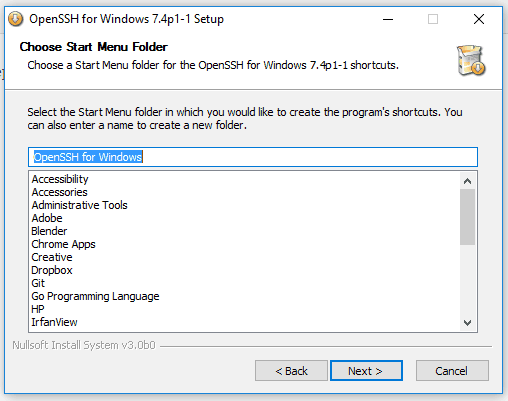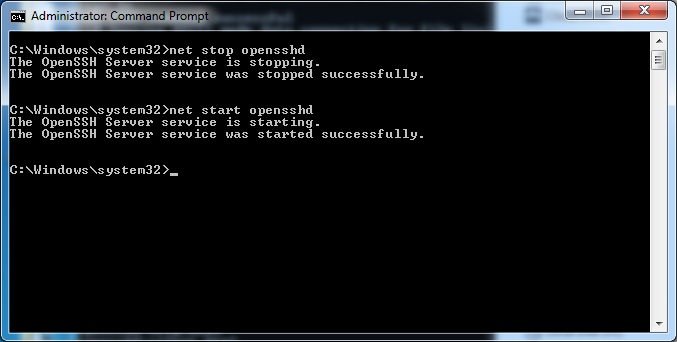Openssh 8.5 Release Notes
Ssh-agent のように daemon として起動し秘密の情報を保持しつつ別プロセスと通信するようなプログラムを書きたくて、ssh-agent はどう実装しているのかざっくり調べた。. OpenSSH is an open source project that provides access to a suite of tools that can help you protect your traffic by relying on the SSH protocol and encryption capabilities. The OpenSSH software collection can handle remote connections via SSH, SCP, and SFTP, and provides key management tools (SSH. にOpenSSHのssh-agentの脆弱性情報(CVE-2021-28041)と、OpenSSH 8.5が公開されています。今回はこちらの脆弱性の概要と、各. Current Description ssh-agent in OpenSSH before 8.5 has a double free that may be relevant in a few less-common scenarios, such as unconstrained agent-socket access on a legacy operating system, or the forwarding of an agent to an attacker-controlled host. Version: 15.3 Rating: 10 Date: 2021-04-16 Votes: 3 I love Linux and am an average user. I know the command line and use it when needed, but with Zorin it's a different experience.
UpdateHostKeys by default, allowing hosts with insecurekeys to upgrade them without creating scary warnings for users. There area lot of other small changes; see the announcement for details.| From: | Damien Miller <djm-AT-cvs.openbsd.org> |
| To: | oss-security-AT-lists.openwall.com |
| Subject: | [oss-security] Announce: OpenSSH 8.5 released |
| Date: | Tue, 02 Mar 2021 18:19:55 -0700 |
| Message-ID: | <12510d5a023346ec@cvs.openbsd.org> |
| Archive-link: | Article |
OpenSSH 8.5 released
Posted Mar 3, 2021 18:13 UTC (Wed) by josh (subscriber, #17465) [Link]
> * ssh(1): disable CheckHostIP by default. It provides insignificant> benefits while making key rotation significantly more difficult,
 > especially for hosts behind IP-based load-balancers.
> especially for hosts behind IP-based load-balancers.
I'm excited to see this change.
> * ssh(1): when prompting the user to accept a new hostkey, display
> any other host names/addresses already associated with the key.
And this one, though it could produce a massive amount of output in some cases.
OpenSSH 8.5 released
Posted Mar 3, 2021 23:12 UTC (Wed) by unixbhaskar (subscriber, #44758) [Link]
> * ssh(1): when prompting the user to accept a new hostkey, display> any other host names/addresses already associated with the key.
This one would be really interesting!
OpenSSH 8.5 released
Posted Mar 4, 2021 1:03 UTC (Thu) by djm (subscriber, #11651) [Link]
> And this one, though it could produce a massive amount of output in some cases.yeah, if this turns out to be a problem in practice then let us know and we'll add a limit.
OpenSSH 8.5 released
Posted Mar 4, 2021 7:11 UTC (Thu) by josh (subscriber, #17465) [Link]
OpenSSH 8.5 released
Posted Mar 4, 2021 10:36 UTC (Thu) by johill (subscriber, #25196) [Link]
OpenSSH 8.5 released
Posted Mar 4, 2021 11:33 UTC (Thu) by nye (guest, #51576) [Link]
OpenSSH 8.5 released
Posted Mar 4, 2021 11:37 UTC (Thu) by Cyberax (✭ supporter ✭, #52523) [Link]
OpenSSH 8.5 released
Posted Mar 4, 2021 12:21 UTC (Thu) by nye (guest, #51576) [Link]
Well unless those hosts are reusing the same host key then there won't be any 'other host names/addresses already associated with the key', so you can't end up with a list containing hundreds of entries.(And if they *are* reusing the same key, then you still won't end up with such a list unless you connect via a new throwaway DNS name for each one instead of using a fixed hostname or the unchanging IP address.)
OpenSSH 8.5 released
Posted Mar 4, 2021 22:06 UTC (Thu) by Cyberax (✭ supporter ✭, #52523) [Link]
OpenSSH 8.5 released
Posted Mar 4, 2021 16:16 UTC (Thu) by josh (subscriber, #17465) [Link]
OpenSSH 8.5 released
Posted Mar 4, 2021 17:43 UTC (Thu) by nye (guest, #51576) [Link]
OpenSSH 8.5 released
Posted Mar 4, 2021 22:06 UTC (Thu) by josh (subscriber, #17465) [Link]
OpenSSH 8.5 released
Posted Mar 7, 2021 12:21 UTC (Sun) by vadim (subscriber, #35271) [Link]
You can configure a DHCP server to hand out leases for a long time, like a month or even a year.Then you'll have a lot less of this happening, as each VM will end up using the same address virtually all the time.

OpenSSH 8.5 released
Posted Mar 7, 2021 15:12 UTC (Sun) by Cyberax (✭ supporter ✭, #52523) [Link]
Then you'll run out of addresses, since VMs are disposable and each new VM gets a new MAC.
OpenSSH 8.5 released
Posted Mar 8, 2021 0:22 UTC (Mon) by josh (subscriber, #17465) [Link]
My use case: one hundred systems with the same ssh host key
Posted Mar 8, 2021 17:13 UTC (Mon) by emmi3 (guest, #62443) [Link]
I have the following setup: nearly one hundred thin clients for home office use ('Telearbeit' / tele work) running from the same live linux image.Openssh 8.5 Rpm

Openssh 8.3
The (cutomized) images are built using live-build form debian-live. Normally live-build would delete the ssh host key during build time and live-config would create a new ssh host key on every startup. This was undesirable since ssh would complain about the changed host key after every reboot of the thin client. Therefore I baked one predefined host key directly into the image.
Openssh 5 Compatibility
The thin clients are connected to our university environment via wireguard using a 10-something private subnet. Thus we have nearly one hundred different physical hosts (with different but fixed IPs and hostnames) using the same ssh host key.
Centos Openssh 8.5
I don't see anything wrong with this setup and I think this is a valid use case. If my ssh client starts complaining about all those hosts having the same host key, I will have to start creating separate keys for every client and distributing them like I do with the wireguard preshared keys and other client specific data right now. No big deal, but I don't really see any benefit from this.
